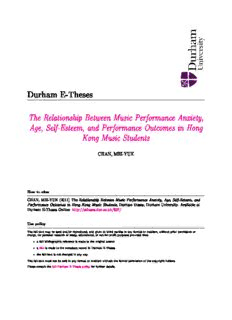
the relationship between music performance anxiety, age, self-esteem, and performance outcomes ... PDF
Preview the relationship between music performance anxiety, age, self-esteem, and performance outcomes ...
Durham E-Theses The Relationship Between Music Performance Anxiety, Age, Self-Esteem, and Performance Outcomes in Hong Kong Music Students CHAN, MEI-YUK How to cite: CHAN, MEI-YUK (2011) The Relationship Between Music Performance Anxiety, Age, Self-Esteem, and Performance Outcomes in Hong Kong Music Students, Durham theses, Durham University. Available at Durham E-Theses Online: http://etheses.dur.ac.uk/637/ Use policy Thefull-textmaybeusedand/orreproduced,andgiventothirdpartiesinanyformatormedium,withoutpriorpermissionor charge,forpersonalresearchorstudy,educational,ornot-for-pro(cid:28)tpurposesprovidedthat: • afullbibliographicreferenceismadetotheoriginalsource • alinkismadetothemetadatarecordinDurhamE-Theses • thefull-textisnotchangedinanyway Thefull-textmustnotbesoldinanyformatormediumwithouttheformalpermissionofthecopyrightholders. PleaseconsultthefullDurhamE-Thesespolicyforfurtherdetails. AcademicSupportO(cid:30)ce,DurhamUniversity,UniversityO(cid:30)ce,OldElvet,DurhamDH13HP e-mail: [email protected]: +4401913346107 http://etheses.dur.ac.uk 2 THE RELATIONSHIP BETWEEN MUSIC PERFORMANCE ANXIETY, AGE, SELF-ESTEEM, AND PERFORMANCE OUTCOMES IN HONG KONG MUSIC STUDENTS Meiyuk Joanna Chan Abstract Existing studies suggest that music performance anxiety can undermine the quality of performances regardless of performers’ ages. However, most of the studies have focused on professional musicians. It is crucial to know when music performance anxiety occurs in order to minimize its effects on young musicians including the ongoing psychological damage done to them. The present study is intended to investigate: 1) whether there was support for the claim that music performance anxiety has an early onset in young children; 2) to what extent music performance anxiety is associated with self-esteem; 3) whether there is support for the claim that performance outcomes are affected by one’s anxiety levels. The State-Trait Anxiety Inventory for Children (STAIC) by Spielberger (1973) and the Self-Esteem Scale (SES) by Rosenburg (1965) were the major psychometric measures. A researcher-designed questionnaire was also used to collect participants’ demographic data and their experiences as well as the ways they coped with music performance anxiety. They were asked to identify their feelings based on the items adapted from the Music Performance Anxiety Inventory for Adolescents or MPAI-A (Osborne and Kenny, 2005). One hundred and seventy-four participants aged from 7 to 18 participated in the present study. Findings of the present study suggest that age is significantly related to participants’ pre-SAS and the number of symptoms. In addition, MPA was found to be more prevalent in older age ranges but no significant differences were found between different age groups. In addition, evidence from the current study supported the claim that self-esteem is negatively correlated with MPA. It was also revealed that no relation was found between one’s music performance anxiety and the quality of music one played. However, participants’ anticipated outcomes of their quality of performance may be related to music performance anxiety. Findings from the study are discussed in terms of their relevance to the Hong Kong context and their implications for practice. 1 THE RELATIONSHIP BETWEEN MUSIC PERFORMANCE ANXIETY, AGE, SELF-ESTEEM, AND PERFORMANCE OUTCOMES IN HONG KONG MUSIC STUDENTS Meiyuk Joanna Chan A DOCTORAL THESIS in Education Presented to the Faculties of the Durham University in Partial Fulfillment of the Requirements for the Degree of Doctor in Education 2011 2 Table of Contents Abstract …………………………………………………………………….……… p.1 Title Page ……………………………………………………………….....……… p.2 Table of Contents ………………………………………………………….……... p.3 List of Abbreviations ………………………………………………………….….. p.5 Declaration ……………………………………………………………………..…. p.6 Statement of Copyright …………………………………………………….……. p.7 Acknowledgements ……………………………………………………..……….. p.8 Chapter One: Introduction 1.1 Background ………………………………………………………….…. p.9 1.2 Self-Esteem and Music Performance Anxiety …………….…….….. p.45 1.3 Music Performance Anxiety and Performing Outcomes ……….….. p.52 1.4 Treatment of Music Performance Anxiety …………………..…...….. p.57 1.5 Music Performance Anxiety and Cultural Differences …….....….…. p.69 Chapter Two: Methodology 2.1 Psychological Measures …………………………………………..…. p.63 2.2 Music Performance Measurement ………………………………..… p.65 2.3 Research Questions …………………………………………….….… p.67 2.4 Research Method ……………………………………………….…..... p.71 Chapter Three: Results ………………………………………………………... p.77 Chapter Four: Discussion 4.1 Music Performance Anxiety and Age ………………………………. p.89 4.2 Music Performance Anxiety and Self-Esteem …………………..… p.92 4.3 Music Performance Anxiety and Performance Outcomes …….… p.95 3 4.4 Limitation ………………………………………………………….. p.101 Chapter Five: Implications 5.1 Implications for Practice.……………………..…………....….…. p. 104 5.2 Implications for Policy …………………………………….……... p. 109 Chapter Six: Conclusion ……………………………………………….….. p.113 Reference ………………………………………………………….……….. p. 115 4 List of Abbreviations MPA Music Performance Anxiety PostSAS Post-Test State Anxiety Scores PreSAS Pre-Test State Anxiety Scores SES Self-Esteem Scale STAIC State-Trait Anxiety Inventory for Children 5 Declaration This thesis has been composed by me, alone and it has not been accepted in any previous application for a degree in this or any other institution. The work has been done by me solely. All quotations have been distinguished by quotation marks and the sources of information specifically acknowledged. 6 Statement of Copyright The copyright of this thesis rests with the author. No quotation from it should be published without the prior written consent and information derived from it should be acknowledged. 7 Acknowledgements I would like to express my sincere gratitude to Dr. Richard Remedios, for his encouragement and intellectual input during the entire course of this thesis. I would also like to express my appreciation to Professor Joe Elliott for his valuable advice that he provided me over the entire course of this thesis. Without their efforts, this work would not have been possible. In addition, I would like to thank my committee members Professor Susan Hallam and Professor Mike Fleming for their support and advice. Furthermore, I would like to thank Mr Brad Mellen for his assistance in improving the linguistic quality of this thesis. Finally, I wish to thank my family and friends who have always been a constant source of inspiration to me. 8
Description: